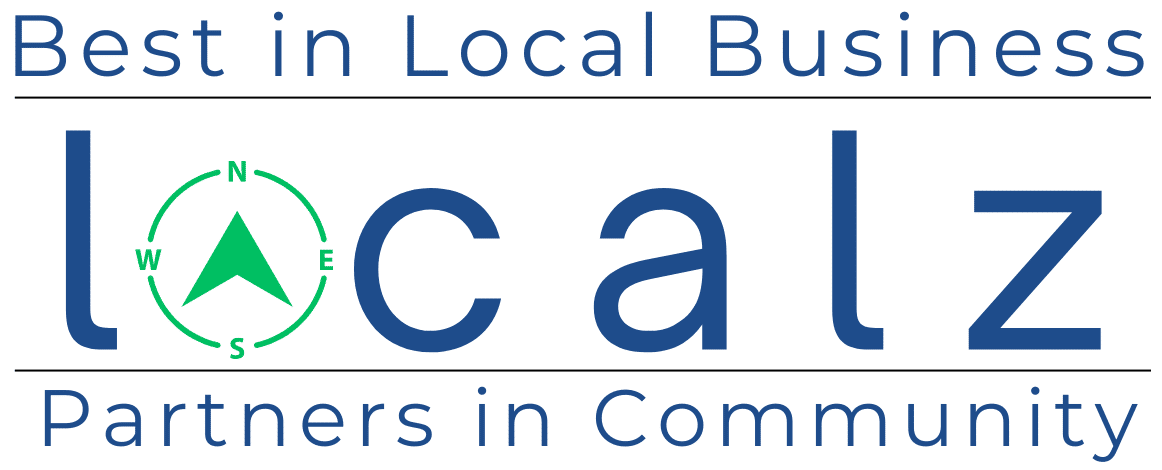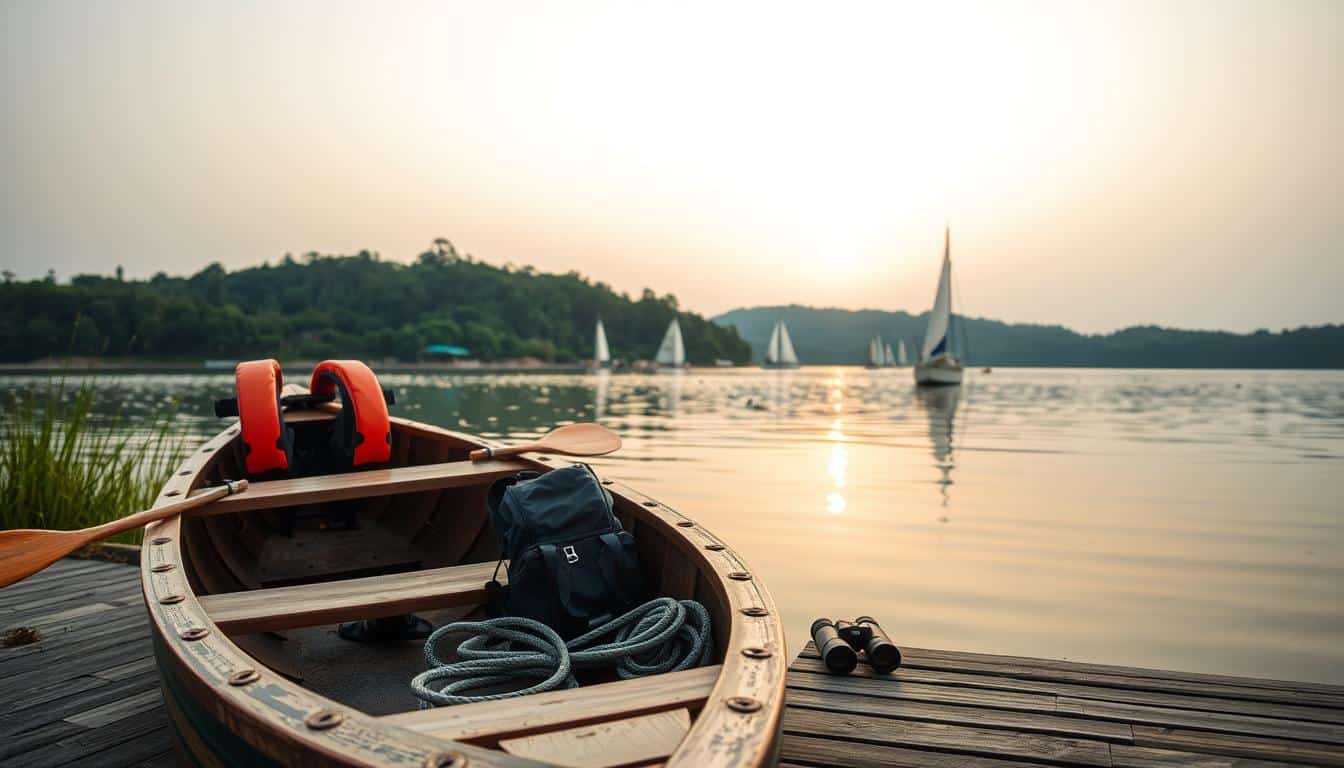Are you ready to explore the open waters? Or do you know the boating safety steps needed for a safe trip? Boating is a great way to connect with nature and enjoy fun activities. But, it’s important to be well-prepared to avoid risks.
Weather changes, equipment problems, and the need for safety gear are key. By following important boating tips, you can have a safe and fun time on the water. A detailed checklist with safety items, knowing the environment, and more is vital for a stress-free trip.
Key Takeaways
- Learn about boating safety rules in your area.
- Buy the right safety gear, like life jackets.
- Check the weather before you go.
- Use navigation tools to stay safe.
- Make a detailed checklist for your trip.
- Get advice from local experts.
- Remember your role in protecting the environment while boating.
Understanding Boating Safety Regulations
Knowing boating safety rules is key for a fun and safe time on the water. These rules help keep everyone safe while boating. They make sure boaters follow both national and state laws.
National Boating Safety Standards
The U.S. Coast Guard sets rules for boating safety across the country. These rules cover what equipment you need, how to operate your boat, and safety classes. Following these rules is important for safe boating.
State-Specific Regulations to Know
While national rules are a base, states have their own laws too. For example, some states require kids to wear life jackets always. Others might need you to get a license or safety training. Knowing these local rules is important.
Importance of Life Jackets
Life jackets are very important for boating safety. They help keep people afloat if they fall into the water. Make sure life jackets fit everyone on board well. Wearing them right is not just a rule, it’s a safety must.
Essential Boating Gear for Your Trip
Getting ready for a day on the water means thinking about safety first. You also need good navigation tools and comfort items. The right gear ensures you follow the rules and feel safe.
Must-Have Safety Equipment
Safety equipment is the first thing to consider. Life jackets are key to keeping everyone safe. Also, have a first aid kit, flares, and fire extinguishers ready for emergencies.
Choosing top-notch safety gear makes your trip safer. It keeps safety in mind every moment.
Navigation Tools and Technology
Good navigation is critical for any water trip. Use GPS devices and compasses to find your way. Nautical charts help you avoid dangers and stay on course.
Having the right tools means you can explore with confidence. They help you navigate new waters safely.
Comfort Items for an Enjoyable Experience
Comfort items make your trip better. Comfortable cushions make long days more enjoyable. Don’t forget food, drinks, and bug spray to keep everyone happy.
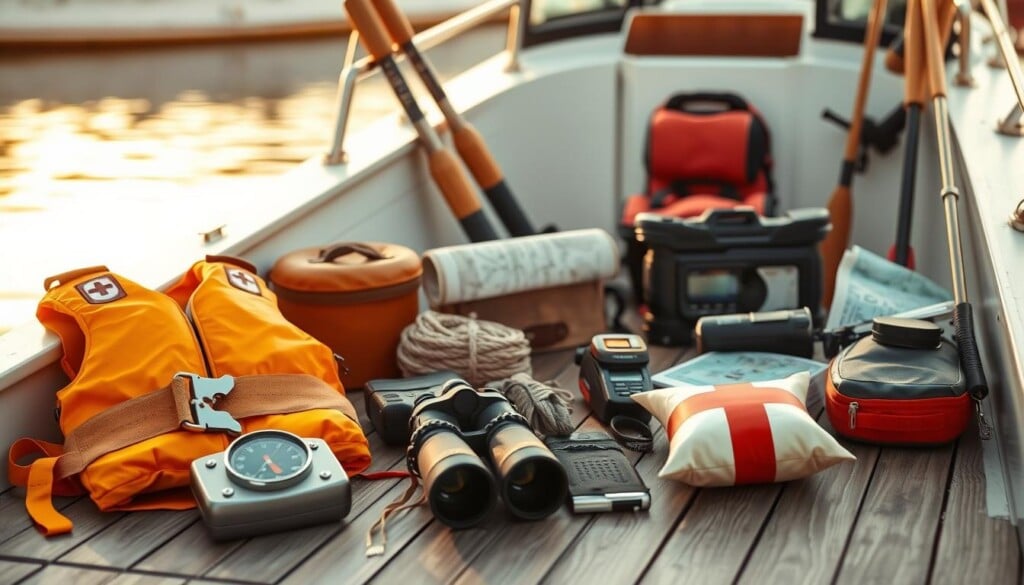
Choosing the Right Type of Boat
Choosing a boat means knowing the different types and their uses. The market has powerboats, sailboats, and personal watercraft. Each has special features for activities like fishing, leisure, or travel. Knowing these helps buyers make smart choices based on their needs.
Different Types of Boats Explained
Powerboats are fast and great for fun and sports. Sailboats use wind and are loved by sailing fans. Personal watercraft are fun for small groups and short trips. Each type has its own appeal and purpose.
Factors to Consider When Selecting a Boat
Choosing a boat involves several key factors. The size of the boat matters for space and handling. Think about what you’ll use it for, like fishing or cruising. Also, check local laws to ensure the boat meets safety and legal standards.
Popular Boat Models in the U.S.
In the U.S., popular boats include the Bayliner Element, Sea Ray SPX, and Yamaha 242X. Each has unique features for different activities. Looking at user reviews and specs helps buyers choose the best one for them.
Pre-Trip Preparation: What to Do Before You Go
Getting ready before you go is key to a great boating trip. Check the weather and pick the safest time to sail. This part covers three important steps to take before you hit the water.
Weather Checks and Safety Precautions
Weather checks are a must for boating safety. Knowing the weather forecast helps you decide when to leave. Thunderstorms, high winds, and rough seas can come up fast, so watch the weather closely.
Fueling and Equipment Checks
Make sure your boat has enough fuel for the trip. Running out of fuel is dangerous. Also, check that all safety gear, like life jackets and flares, are ready to go. These steps help you handle any surprises on the water.
Packing Essentials for a Day on the Water
Bring everything you need for a fun day on the water. Don’t forget snacks, water, and things like sunscreen and hats. Making a list helps you remember important items, which is vital for a long day out.
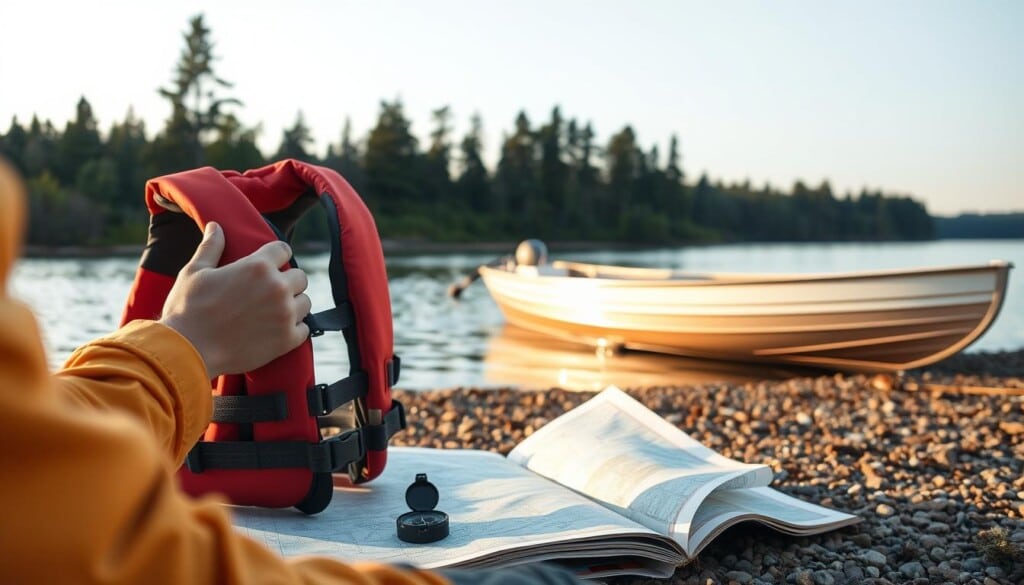
Boating Techniques for New Enthuisiasts
Learning boating techniques is key for newbies. Knowing how to navigate safely and well is important. Understanding visual markers, GPS, and nautical charts helps you feel confident on the water.
Basic Navigational Skills
Getting good at navigation means knowing landmarks and using GPS. Learning about nautical charts is also key. It tells you about depths and dangers. Practicing these skills makes boating safer and more precise.
Docking and Undocking Tips
Good docking tips can make arriving and leaving easier. It’s important to slow down when approaching the dock. This lets you make the right adjustments.
Using spring lines helps keep the boat stable. Telling your crew what you plan to do keeps everyone safe and in sync.
Anchoring Safely
Safe anchoring is critical for staying stable when you’re not moving. Choosing the right anchor for the situation is important. Make sure you have enough rope out to hold the boat in place.
Check your anchor often, even more so in changing weather or tides. This keeps you safe and secure.
Navigating Local Waters: Tips for New Boaters
Understanding local waterway rules is key for new boaters. Each area has its own challenges, like hazards and busy spots. Knowing the rules helps ensure a safe and fun time on the water.
Understanding Waterway Rules
Waterway rules guide safe boating and prevent accidents. Boaters must follow speed limits and right-of-way rules. Knowing when to yield in narrow spots is very important.
Identifying Local Hazards
Local hazards like shallow spots and submerged rocks are common. Knowing about these helps boaters make safer choices. It’s important to research your waterway and stay alert to changing conditions.
Best Practices for Maintaining a Safe Distance from Other Boats
Keeping a safe distance from other boats is vital. Boaters should have enough space to move and avoid crashes. In crowded areas, always watch the distance to other boats and adjust speed to stay in control.
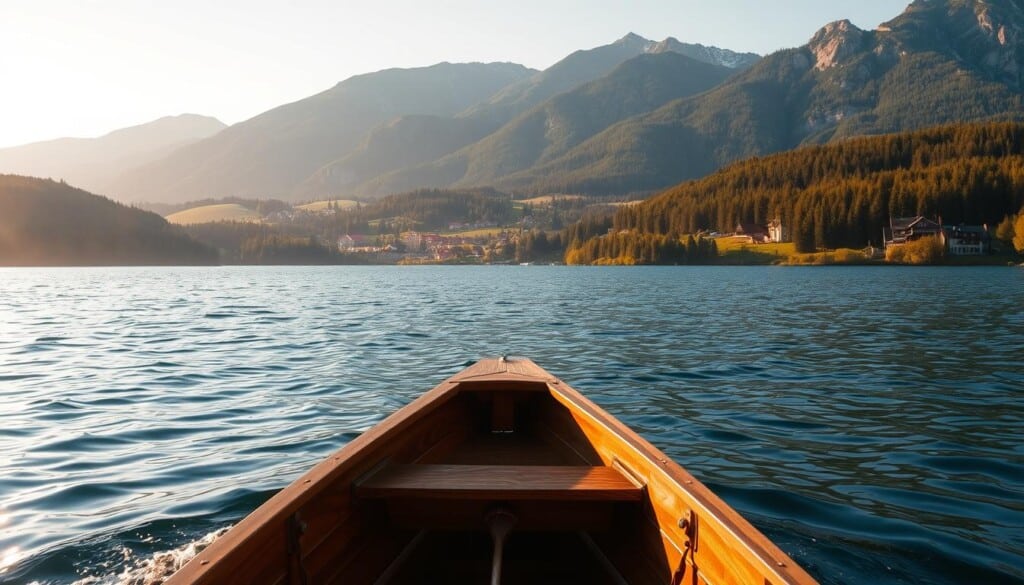
Connecting with Local Businesses through LocalZ
LocalZ is a great tool for boating lovers. It connects them with local businesses that make their time on the water better. It’s like a big directory that helps find what you need for boating adventures.
How LocalZ Enhances Your Boating Experience
LocalZ gives users access to local businesses with special boating services. You can find everything from maintenance to custom boat mods. It uses community knowledge to make sure your boating is safe and fun.
Finding Nearby Boating Services and Rentals
Finding boating services and rentals is now super easy with LocalZ. It helps find trusted boat rental companies. This makes getting the right boat for your day out quick and easy.
Engaging with Local Experts for Your Needs
LocalZ helps connect you with local experts who know boating inside out. You can find insurance agents and rental providers with local knowledge. Working with these experts makes your boating trip better and builds a community feeling.
Responsible Boating: Caring for Waterways
Responsible boating is key to keeping our waterways healthy. By following best practices, boaters help keep waterways clean and protect wildlife. They also make sure to follow environmental rules. This creates a culture of caring for our aquatic environments.
Best Practices for Keeping Water Clean
Keeping waterways clean is all about responsible boating. It means disposing of waste properly and using pump-out stations for sewage. It also means not letting chemicals run off into the water.
Boaters should never dump waste or harmful materials into the water. Keeping boats in good shape helps prevent spills and leaks. This protects our delicate aquatic ecosystems.
Wildlife Protection While Boating
Protecting wildlife is a big deal for boaters. Boats can disturb animals’ homes and paths. It’s important to slow down in sensitive areas and follow speed limits.
Boaters need to know local laws that protect endangered species. This helps keep our biodiversity safe. It’s all about respecting the environment while having fun on the water.
Understanding Environmental Regulations
Boaters need to know the environmental rules. These rules tell us what we can and can’t do in certain places. They also tell us about materials and activities that are off-limits.
By learning these rules, boaters can make choices that help the environment. This way, they can enjoy the water without harming it.
Emergency Preparedness on the Water
Being ready for emergencies while boating is key to safety. An effective emergency plan is essential for handling boating accidents. It should list roles for each person, communication methods, and what to do in emergencies.
Creating an Emergency Plan
Creating a detailed emergency plan boosts water safety. It should cover actions for emergencies like engine failure or bad weather. Assigning roles and identifying contact points are important for emergency preparedness.
Essential Emergency Equipment
Having the right emergency equipment is vital. Your boat should have a first aid kit, signaling devices, and reliable communication tools. This ensures a quick response to unexpected challenges, keeping everyone safe.
What to Do in Case of an Accident
If a boating accident happens, acting fast and correctly is critical. First, check for injuries and give first aid if needed. Then, start rescue efforts to make sure everyone is safe. Quick actions and clear communication can lessen the accident’s impact.
Enjoying Your Day Out: Making the Most of Boating
Getting the most out of boating means trying different activities. Fishing and water sports make any day special. They let you enjoy the water and bond with friends.
Whether you’re fishing for a big catch or riding a jet ski, it’s fun. These activities fill your day with excitement and laughter.
Tips for Fishing and Water Sports Activities
Switching between fishing and water sports keeps things exciting. Fishing spots are often calm coves or near underwater features. Water sports are best in open areas with lots of space.
Always wear life jackets and follow local rules. This makes boating safer and more enjoyable for everyone.
Creating Lasting Memories with Family and Friends
Doing these activities creates lasting memories. Laughter, competitions, and adventure bring people closer. Whether it’s catching a big fish or learning a new sport, these moments are unforgettable.
They help create bonds that last for years. These memories are something to cherish forever.
Resources for Local Events and Promotions
Boating can also include local events and promotions. Communities often have fishing tournaments, water sports competitions, and family outings. Staying updated through local resources can enhance your experience.
It also supports local businesses and builds community spirit. These events make your time on the water even more special.
